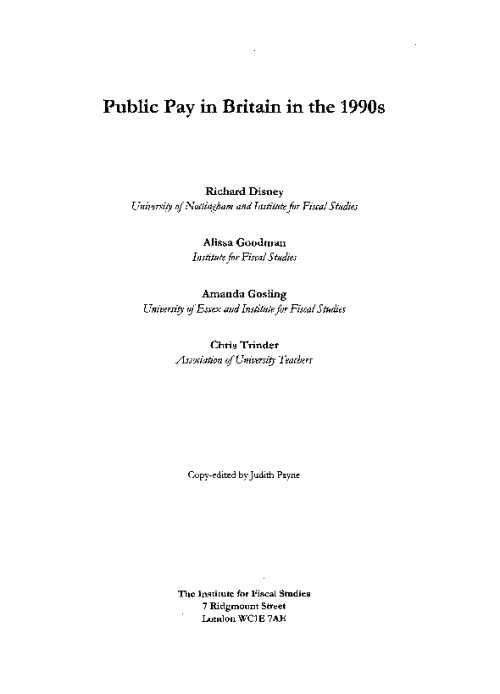Downloads

comm72.pdf
PDF | 2 MB
This Commentary looks at public pay in detail, tracing its trend relative to the private sector over the 1980s and 1990s and showing how the gap in pay between the public and private sectors differs dramatically across occupations, gender and education groups. These findings illustrate how misleading comparisons of public and private sector pay based on aggregate data can be.
Authors

Research Associate University of Sussex
Richard is an IFS Research Associate, a Part-time Professor of Economics at the University of Sussex and a Visiting Professor of Economics at UCL.

Research Fellow University College London
Alissa is an IFS Research Fellow and a Professor of Economics and Director of the Centre for Longitudinal Studies at the UCL Institute of Education.

Amanda Gosling

Chris Trinder
Report details
- DOI
- 10.1920/co.ifs.1998.0072
- ISBN
- 978-1-873357-83-5
- Publisher
- IFS
Suggested citation
Disney, R et al. (1998). Public pay in Britain in the 1990s. London: IFS. Available at: https://ifs.org.uk/publications/public-pay-britain-1990s (accessed: 6 May 2024).
More from IFS
Understand this issue

Public investment: what you need to know
25 April 2024

If you can’t see it, you can’t be it: role models influence female junior doctors’ choice of medical specialty
24 April 2024

Sure Start achieved its aims, then we threw it away
15 April 2024
Policy analysis

Recent trends in public sector pay
26 March 2024

The short- and medium-term impacts of Sure Start on educational outcomes
9 April 2024

Sure Start greatly improved disadvantaged children’s GCSE results
9 April 2024
Academic research

Labour market inequality and the changing life cycle profile of male and female wages
15 April 2024

Interpreting cohort profiles of lifecycle earnings volatility
15 April 2024

There and back again: women’s marginal commuting costs
2 April 2024